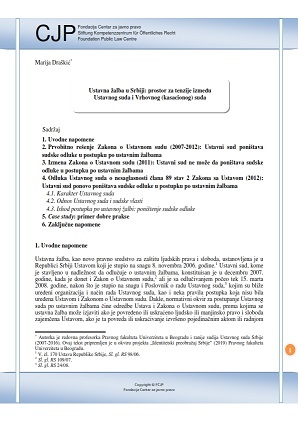Ustavna žalba u Srbiji: prostor za tenzije između Ustavnog suda i Vrhovnog (kasacionog) suda
Constitutional Appeal in Serbia: Space for Tension between the Constitutional Court and the Supreme Court of Cassation
Author(s): Marija Draškić
Subject(s): Constitutional Law, Human Rights and Humanitarian Law, Public Law
Published by: Fondacija Centar za javno pravo
Keywords: Constitution; Constitutional Court; Supreme Court of Cassation; court rulings; protection of human rights and freedoms; public law; Serbia;
Summary/Abstract: The relationship between the Constitutional Court and the Supreme Court of Cassation was not particularly controversial in the period when Constitutional Court`s jurisdiction was kept in the domain of classical jurisdiction in the review of constitutionality and legality of general legal acts. However, when in 2006 Constitutional Court obtained competence for the adjudication on the constitutional appeal and therefore entered the space of constitutionally guaranteed human rights and freedoms`direct protection, a fierce discussion broke out whether Constitutional Court may annul disputed court rulings - especially the decisions of the highest court – whenever it would find that those rulings had infringed constitutionally guaranteed rights. In those proceedings, the Constitutional Court acted in line with its constitutionally established competence, reviewing disputed court rulings to the extent necessary to determine whether ruling violated or denied a constitutional right and freedom, as alleged in the constitutional appeal. Although the difference in the Constitutional Court`s and courts’ of general jurisdiction competence can be well seen and explained on normative and even on practical level, in the jurisprudence it is not always the case. Namely, likewise the courts of general jurisdiction, as well as the Supreme Court of Cassation, sometimes failed to observe the particular legal cases from the broader horizon of constitutional law, causing their decisions to come to the Constitutional Court and be annulled on the grounds of established violation of guaranteed rights and freedoms, it`s also true that in some other cases the Constitutional Court had a tendency to step out of its jurisdiction and get inadmissible close to the character of control by the higher instance over the rulings of the courts. Nevertheless, such particular cases should be an impulse to judges, legal theoreticians and authors, general public included, to contribute with their arguments to controversial issues` resolving, and not to a priori generally negate the Constitutional Court`s nature of human rights and freedoms protector which stands above the courts of general jurisdiction. In other words, although the Constitutional Court is often labeled as “stronger”, “higher” or “superior” in the relation to judicial power, what matters in reality is the complementary acting of the Constitutional Court and courts of general jurisdiction, with mutual appreciation and arguments respected, especially when those arguments are opposed. Only in that way, in a partner relationship, in mutual interaction and dialogue, whose frames are defined by the Constitution, Constitutional Court and judicial power can contribute to the real rule of law and complete protection of human rights and freedoms.
Series: Fondacija Centar za javno pravo - Projekti
- Page Count: 16
- Publication Year: 2019
- Language: Serbian
- Content File-PDF
- Introduction

